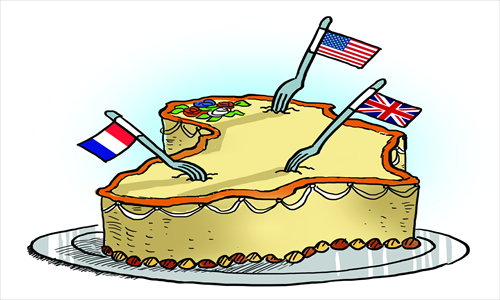By Terpsi Vassilopoulou,
As studies in international relations and world politics are developing, scholars have come to view the occurrence of modern international order among states and organisations as a product of the past two centuries, as this is when various regional systems were forged into a deeply interdependent, global international order. One of the most noteworthy characteristics of this contemporary international order, is the particularly strong presence of “Western” elements, as in ideas, institutions etc. The West (meaning Europe, with a greater emphasis on the Western and Northern countries, and America, with an emphasis on the United States) looms large in the functioning of global political economy, with some of the biggest economic centres finding themselves located in Western capitals (London, New York etc.) while it is also home to the headquarters of some of the most crucial international organisations (UN) making itself a political centre as well. Furthermore, Western ideas such as human rights, gender equality and more, as well as Western culture, are well spread around the globe and even constitute life models for many. Why is there such a strong Western presence in global order though? Is this dominance a result of the West’s innate strengths or are there more factors we should consider?
There is truly a wave of scholars arguing in favour of Western superiority, especially during the 19th century, when what we now recognise as modern international order was formulated and established. One of the biggest arguments here, lays in the Enlightenment and the developments caused by the vast circulation of ideas within Western grounds. Many core ideas of now Western culture emerged at the time, a plethora of which include principles such as equality, freedom of speech and independent thought, still fundamental to Western societies. Such principles where the ones that also started promoting political engagement of all social classes eventually leading to the West having the most representative institutions prompting negotiations and heightening the engagement among elites and the public. Such conquests though didn’t come without a price for the people but were rather a result of great turmoil and conflict. The West experienced a really large number of social revolutions while it was also at interstate war for 75% of the years between 1494 and 1975. While war is truly abhorrent and destructive to anyone involved, in this case it forced Western powers to develop their economic practices, in order to support their expenses, and create a strong bureaucratic and taxation system which then gave them a great advantage in comparison to the rest of the world. Last but definitely not least, driven by the needs of war and with the scientific revolution fostered by enlightenment ideas, the west proceeded to great technological developments and discoveries too.

While all of the above mentioned is true, there is a different group of scholars supporting that none of the Western potential for domination would have been fulfilled without the existence of the developing world. To begin with, most of the materials fundamental to Western industrialisation and the economic power that came with it, originated from sources in the developing world. Most notably cotton is not indigenous to England, while other prime examples are the gold and silver mining in Asia and diamonds found in Africa. At the same time a variety of different techniques and technological developments when it comes to production and not only, first originated in the developing world and were then spread to the west through migration where they were further developed. The most striking argument though when it comes to the West relying in the developing world for its domination in international order, is that of imperialism. On a basis of racism, inequality and economic exploitation of different grounds, the west managed to create colonies all around the globe, resulting for example to empires like the British one “where the sun never sets”. Between 1815 and 1865, Britain alone conquered new territories at an average rate of 100,00 square miles per year. Particularly crucial though, was the restructuring of the conquered economies leading to the creation of a primary producing “periphery” and a secondary “core”. Western powers established a global economy in which they eroded local economic practises and imposed their own price and production system. As a result Western states, turned an age-old and more or less balanced system of trade in elite goods, into a global market sustained by mass trade and marked by inequality.
In conclusion, in order to understand modern international order and its challenges with its deep interdependence politically, economically and culturally, it is really important to understand how we got here. Without a doubt Western powers and ideas are fundamental to this global order. However, with Western domination built on Indian textiles, Chinese porcelain, African slaves and colonial labour its foundations seem to be shaking. The West keeps ignoring these sentiments at its peril, but that can not change them from being true.




